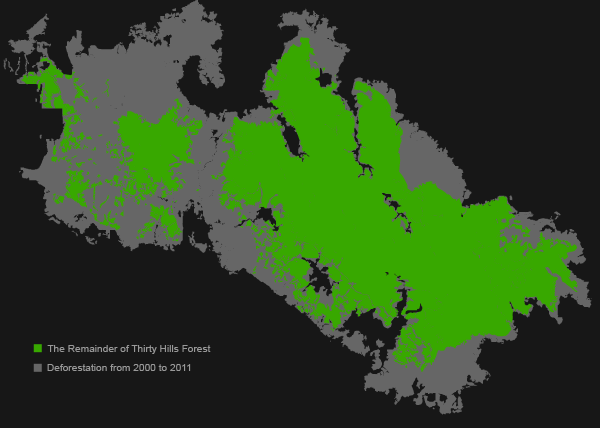Why Now
As recently as the 1950s, the island nation of Indonesia was dense forest. Today, just half of these tropical forests remain. Nowhere is this rapid deforestation more apparent than on the island of Sumatra. Every minute, an area of forest the size of 5 football fields is cleared for timber and replaced with mostly pulpwood, rubber and oil palm plantations. These forests have been growing for thousands of years and are one of the most bio diverse places in the world, but at the current rate these unique ecosystems and all of their inhabitants could be gone in just a few decades.
Today an area of especially rich forest in central Sumatra called 30 Hills is being logged for pulp and paper production. Illegal oil palm plantations are being developed and a vast area is waiting to be converted into rubber plantations.

Only 42% of 30 Hills – the most hilly area – is protected as the Bukit Tigapuluh National Park. The unprotected portion outside the park is appealing to pulp and paper, rubber and palm oil developers because the gentle hills and lowlands are easy to clear and convert to plantations. These low-lying areas are also the most important terrain for critically endangered Sumatran tigers, elephants and orangutans, putting them in the direct path of the bulldozers that come to clear the forest. The animals that survive the first onslaught of deforestation are subsequently threatened by starvation, conflict with the plantation workers, illegal encroachers and poachers who follow, once easy access is provided by logging roads.

30 Hills is also home to two indigenous tribes, the Orang Rimba and the Talang Mamak, who have lived in the forest and rely on it for survival. If the forest is cleared, these people face a tenuous future of extreme poverty, exposure to outside disease and the loss of their way of life.
The System
In Indonesia, most of the forest is owned by the government and is leased out as long-term “concessions” for activities like logging, mining and industrial agriculture to provide tax revenue and economic development. A very small proportion of the forest is set aside as national parks and wildlife reserves.
Most of the forest remaining in 30 Hills (outside the national park) is zoned as logging concessions. A logging company is just a few steps away from receiving approval from the government to change the zoning to completely clear the forest and convert it to tree plantations to feed nearby pulp mills. These tiger and orangutan forests are likely to end up as toilet tissue and office paper if conservation groups can’t secure this forest.
There is little law enforcement to protect forests, and many parts of the forest are already being cleared illegally by individuals who sell the timber and then grow oil palm and rubber trees.